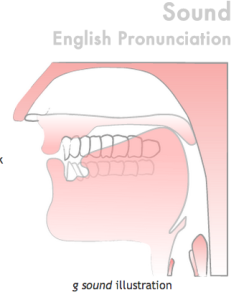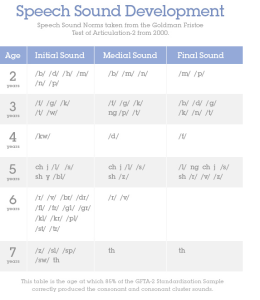Teaching the Sound of Letter G

Teaching the Sound of G. Image courtesy of www.pronuncian.com
“Dess what Mommy?” “Where is the dod?, “When are we donna be there?” Are these familiar questions around your house? Is your son or daughter making a “d” sound in place of a “g”? Or, leaving the “g” sound out all together? If so, don’t fret. Most children under the age of five have some trouble correctly pronouncing certain sounds and words. While most children will usually mispronounce words at some point in her growth, the majority of children outgrow these mispronunciations and master correct sounds by certain ages. And, to make things even more complicated for your young child, there are two distinct sounds of “g” that he or she must perfect: a hard g and a soft g. Is there a way to help guide your child? YES! Here are some tips and tricks for teaching your child the sound of letter g.
Rules for Teaching the Sound of The Letter G
There are rules determining whether or not the sound of letter “g” is hard as in “good”, or a soft sound as in “giant”. The most common rule to remember how to pronounce the sound of the letter “g” is to pay attention to the letter following the “g” in that particular word. However, like many other rules in the English language, there are exceptions. Here are a few key rules:
- Hard g before a consonant (as in glad or great)
- Hard g before a back vowel (go, garden, gum)
- Hard g at the end of a word (big, frog, leg)
- Hard g if it’s a Hebrew name (Gideon, Giliad)
- Hard g before a front vowel in most words of Germanic origin (gift, get, gild)
- Soft g for a word of Greek origin that starts with gy- (gymnasium, gymnastics, gyroscope).
- Soft g before a front vowel if the word has a Romance origin (geography, giant, ginger, general)
As we mentioned, there are always exceptions. Can you think of words that include both a hard “g” sound and a soft “g” sound? How about the words language, or garage! The sound of “g” is also called a “voiced sound” — one in which the vocal chords vibrate. Rachel’s English does a great job demonstrating how to correctly pronounce the sound of the letter “g”.
When Can I Expect My Child to Perfect the Sound of G?
The short answer is usually around the age of three. The longer answer is it depends. There are certain speech development milestones that your child is expected to meet, according to his or her age. Our friends at Mommy Speech Therapy have a terrific graphic that spells out speech milestone expectations. This Speech Sound Development Chart from Goldman Fristoe outlines what age your child should be expected to perfect each sound in the English language.

Speech Sound Development Chart by Goldman Fristoe. Image courtesy of Mommy Speech Therapy
It is during the first 3 years of life, when your child’s brain is developing and maturing, that is really the most intensive period for acquiring speech and language skills. All children vary in their development of speech and language skills. The milestone checklist serves as a guide to determine the normal development of speech and language skills birth to age 5. Of course, the rate of development is different in every child, as some may hit these benchmarks early, or some may be later than the norm. Don’t be alarmed if your child is not achieving these milestones exactly as they are presented on the chart. Instead, these guidelines are there to help doctors and other health professionals determine if your child is on track or if he or she may need extra help. Sometimes a speech delay or articulation disorder may be caused by hearing loss, while other times it may be due to a speech or language disorder.
Go On, Get Practicing!
One tip that may be useful is to have your child practice gargling water. When you gargle water, your tongue is in the same correct position as it needs to be to correctly pronounce the sound of the letter “g”. Give it a try! Also, don’t forget that you are your child’s best role model. Practice saying the “g” sound around the house in conversation, read books together and emphasize that sound (both the soft and hard sounds). Soon enough, your child will be “giddy” that he can make the perfect sound of “g”.



